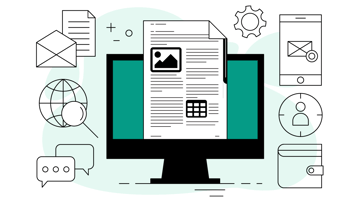Types of Proposals: What You Need to Know
In the world of business and project management, proposals come in several forms. Most are designed to secure funding, win new work, or create a project and move it forward. Here are the types you’ll see most often:
-
Solicited Proposals: Written in direct response to a Request for Proposal (RFP), Invitation to Tender (ITT), or similar official request. These must follow specific requirements and are typically competitive. Learn more about how to write tender proposals.
-
Technical Proposals: Focus solely on how the proposed solution will be delivered. They detail the methodology, approach, technical design, team expertise, and project plan, demonstrating the proposer's capability to meet the technical requirements. Learn more about how to write a technical proposal.
-
Commercial Proposals: Focus solely on the financial aspects. They include detailed pricing, payment terms, contractual terms and conditions, and any cost-related assumptions or exclusions.
-
Unsolicited Proposals: Sent proactively to a potential client or stakeholder, often to introduce a new idea, product, or service without a formal request.
-
Project Proposals: Outlines for new internal or external projects, often covering objectives, outcomes, scope, timelines, and a plan of action. A clear project proposal outline makes your case easy to evaluate.
-
Business Proposals: Broad/short proposals that might include offers for products, services, partnerships, or solutions for clients. They aim to convince stakeholders of your value and the benefits of a collaboration.
-
Grant Proposals: Submitted to secure funding for research, non-profits, or development work, typically to governmental bodies or foundations. They focus on impact, deliverables, budget justification, and compliance with the grantor's guidelines.
-
Renewal, Continuation, and Supplemental Proposals: Used to extend, expand, or add scope to existing work, especially in long-term projects or contracts.
Tips for Proposal Writing: Read the Directions Carefully
The first rule in how to write an effective proposal is simple: always read the directions from start to finish. Most proposal mistakes—and many lost bids (submissions), happen when teams overlook or misread key instructions in the request for proposal (RFP). Missing details like a required executive summary, a safety plan, or supporting documents can cost you the contract.
Take the time to review the RFP line by line. Highlight anything unclear and get clarification early. Make a proposal writing checklist of every requirement outlined in the RFP. This way, your submission will always align with what decision makers are asking for.
Structure Your Proposal for Evaluators
Organizing your proposal to match the evaluator’s process is essential for success. Start by following the sequence of proposal requirements outlined in the RFP, using clear section headers that make it easy to cross-reference your answers. Summarize each section with key points up front, then back them up with relevant details. If the RFP requests a compliance matrix or checklist, include it near the beginning for quick reference.
Remember, most proposals are reviewed by a team—sometimes under tight deadlines. Make information easy to find by using straightforward formatting, numbered sections, and consistent language. Visual aids like tables or charts can also help evaluators compare your documents against others. The easier you make it for decision makers to review and score your document and the better proposal you have, the more likely you are of advancing to the next stage in the process.
Plan Ahead for a Strong Proposal Strategy
Every winning proposal starts with a clear strategy. Before you start writing, define your win themes and identify what matters most to the client and evaluators. Think about the challenges and goals in the RFP. Align your solution with those needs and highlight your strengths.
Gather key facts, supporting case studies, and relevant client stories before you write. This makes your offer more focused and credible for both solicited and unsolicited proposals. Planning ahead also helps the document writing process go faster, with fewer rewrites and a clearer message for potential clients.
Take The Next Step:



Back Up Every Claim with Evidence
An offer needs more than promises. Every key point you make should be supported with solid evidence. Decision makers expect real examples, clear outcomes, and data that proves you can deliver.
Reference relevant documents, include testimonials, and point to actual results you’ve achieved. Storytelling matters here: show how your solution secures funding, delivers value, or solves problems. This approach helps your proposal stand out and builds trust with reviewers.
Storytelling: Bring Your Proposal to Life
Facts are powerful, but stories are unforgettable. To make your documents stand out, use real project examples, client quotes, and clear results to show how your solution works in practice. This isn’t just about adding testimonials—connect your story to the key points in the RFP and the goals of your potential clients.
When reviewing your proposal, evaluators want proof you can deliver, but they also want to picture success with you as a partner.
Remember: brief stories and real data help reviewers remember your submission long after reading.
Win Themes: Connect Your Solution to What Matters Most
The best proposals don’t just answer questions—they tell a story that keeps your key strengths and “win themes” in front of the evaluator from start to finish. Win themes are simple, clear statements about what makes your solution the best fit for the project or contract. These should reflect the client’s goals, project requirements, and the unique value your team brings.
Weave your win themes throughout the entire bid, repeating and rephrasing them in executive summaries, solution sections, and your closing. Use previous documents from your track record as examples of how you’ve delivered on similar themes before.
By making your value easy to remember and tying your strengths directly to the RFP, you help decision makers connect the dots—and you increase your odds of winning.
Include Only What’s Relevant
Keep your proposal focused on what matters to the client and evaluators. Don’t overwhelm the reader with information that doesn’t answer the RFP or isn’t needed to make your case. Cut out any filler, off-topic sections, or repeated background that doesn’t drive the point home.
Every section should help the evaluator see how your documents addresses their requirements and solves their problems. Use clear, direct language, and structure your proposal for easy reviewing. This makes it easier for decision makers to follow your argument and score your submission highly.
Writing for Multiple Reviewers: Make It Easy to Score
Every proposal is read by more than one person—and often by a review panel. Each reviewer may focus on different types of documents, key points, or requirements. That’s why you should structure your proposal so it’s easy for anyone to find answers fast. Use clear headings, logical sections, and refer back to the requirements outlined in the RFP.
Smart cross-referencing, bullet points, and summaries make your proposal easier to review and score. Highlight how your solution meets each requirement and mention the compliance steps you’ve followed. When your proposal writing process keeps every reviewer in mind, your chances of moving forward increase—no matter who picks it up.
Reinforce Win Themes and Use Visuals
Strategic repetition works—remind evaluators of your key strengths and win themes throughout your proposal. Rephrase your main points to reinforce your value, especially in long or complex proposals. Use visuals, tables, and charts to present important information clearly.
Break up text with visuals and quotes to keep the offer engaging. Smart cross-referencing and visual aids help reviewers see how your solution fits every requirement.
Using Technology to Improve Your Document Writing Process
Today’s proposal teams face tighter deadlines, larger documents, and growing complexity. Relying on manual tools or disconnected files slows you down and increases the risk of mistakes. Using proposal software, AI writing tools, and automated compliance checkers can streamline your entire writing process.
Technology can help you organize templates, track changes, and manage contributions from multiple writers—making it easier to maintain tone consistency and meet all requirements outlined in the RFP. Visual tools can improve your use of charts and graphics, while content libraries speed up finding the right examples or case studies.
Especially for complex documents or large projects, these digital solutions free up more time for critical thinking and persuasive storytelling. Adopting proposal management software gives your team a competitive edge, helps secure funding, and supports a more efficient, reliable document writing process.
Review, Edit, and Polish
Before you submit, review your documents as a team. Don’t rely on a single read-through. Ask reviewers to check for compliance, clarity, and tone consistency. Make sure all requirements are covered, all links and references are correct, and every section supports your win themes.
Final editing should focus on plain language, simple structure, and correcting any errors. A strong review process improves your chances with decision makers and helps your offer stand out among all types of proposals, including those that secure funding and win high-value contracts.








